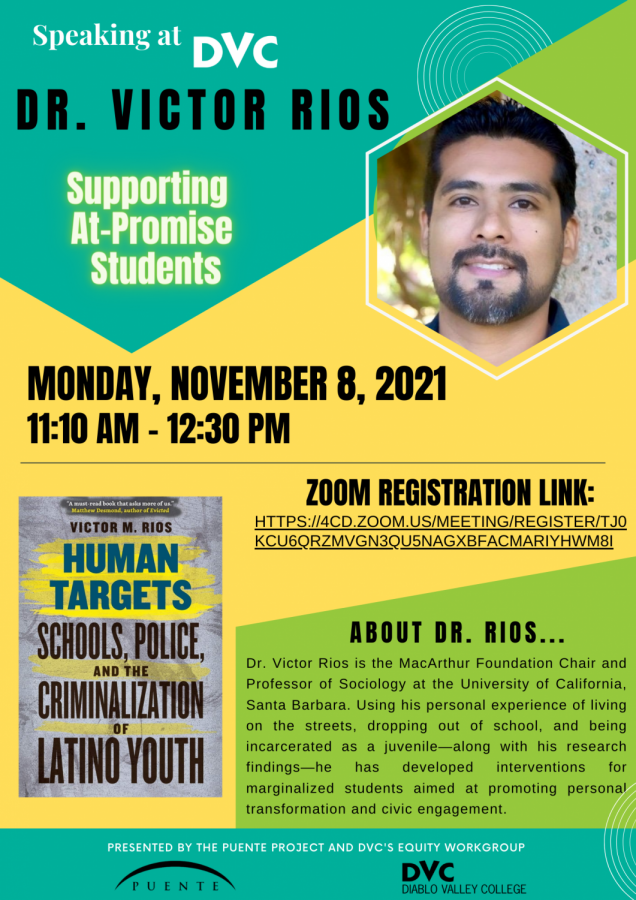Dr. Victor Rios, Author of “Human Targets,” Tackles Racism and At-Risk Students in High-Risk Communities
December 2, 2021
Victor M. Rios is an author, professor and researcher who has published multiple books about how Latino youth are constantly overlooked yet overpoliced. His 2017 book Human Targets: Schools, Police, and the Criminalization of Latino Youth covers how schools and teachers can help kids off the street and lead them to a brighter future.
On Nov. 8, the Puente program at Diablo Valley College hosted Rios in a Zoom discussion that ranged from the ways teachers and authority figures affect students’ perceptions of themselves and their racial identity, to how schools and police have promoted the criminalization of Latino and Latina youth.
The talk included two DVC English professors from Puente, Anthony Gonzalez and Stephanie Razo; political science professor Albert Ponce; and counselors and co-coordinators Brenda Gonzalez and Justin Wembez.
Puente is a program that helps Hispanic students transfer to four-year colleges with counselling and peer support. Rios came to the program to help encourage the students to keep pursuing higher education, despite the struggles they face.
Rios shared his own progression through the public school system in an effort to educate others about the struggles of disadvantaged youth – and how adults in our institutions can fail students.
Rios revealed that by the time he was in fourth grade, he had given up on education because he was labeled a troublemaker after failing to answer a question on the board. The reason he could not answer the question, Rios said, was because he hadn’t taken a vision test and his family could not afford to buy him glasses at the time.
From that moment on, Rios gave up on his passion to learn. He wound up in fights and hung out in the street with gangs in high school. His life only changed when a teacher, Ms. Russ, encouraged him to go to community college to make up lost credits – and to get his life together.
“My teacher, Ms. Russ, that’s the lady that got me from all laughs back to caught-up and on track,” Rios said. “She [said], ‘Victor, I’m so proud of you. I knew you could do it.’ She saw me as a professional, even though that professional did not exist for [the next] 20 years.”
Students and professors from Puente English classes had previously read and discussed different elements of Rios’s book, Human Targets, which has been compared with another important book in the curriculum, Undocumented Americans, by Karla Cornejo Villavicencio.
In the conversation, students agreed that having proper teachers and support is vital to gaining the confidence they need to access higher education and achieve a brighter future.
“[Human Targets] really made me reflect on how lucky I am for everything that I have and reinforced my gratitude,” said DVC student Kevin Ramoz. Responding to Rios’s work, Ramoz added, “Overall, this book was great and the author really captures the harsh reality that these students have to go through.”
Rios said professors and institutions should make a real effort to understand systemic racism and racial bias, and to try and establish stronger connections to the student population. He said he connects with students by having simple conversations with them before class, always making himself available during office hours, and constantly letting them know he is there to help.
It has been his goal to help “prop up young people’s ability to make it, especially those that have faced many obstacles,” he said.
Highlighting the importance of investing in students, and tying it to his own experience, Rios concluded, “When I make it, my whole community and my whole family make it.”






































































